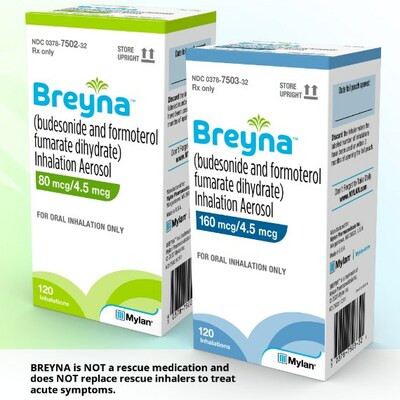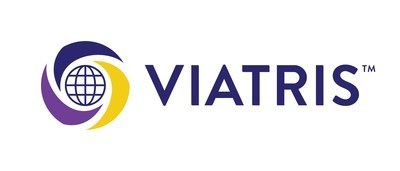Launch demonstrates companies' commitment to bringing complex
generic medicines to the market to help increase patient
access
PITTSBURGH and WOODBURY,
Minn., July 31, 2023 /PRNewswire/ -- Viatris Inc.
(NASDAQ: VTRS), a global healthcare company, and Kindeva Drug
Delivery L.P. today announced the launch of
Breyna™ (budesonide and formoterol fumarate dihydrate)
Inhalation Aerosol, the first generic version of AstraZeneca's
Symbicort® with an Abbreviated New Drug Application
(ANDA) approved by the U.S. Food and Drug Administration (FDA).
Breyna, a drug-device combination product, is indicated
for certain patients with asthma or chronic obstructive
pulmonary disease (COPD) and will be immediately available in both
80 mcg/4.5 mcg and 160 mcg/4.5 mcg dosage strengths.

Viatris Head of North America Jose Cotarelo said: "We are
excited to bring Breyna to the U.S. market for the many Americans
living with asthma and COPD. This launch represents years of hard
work breaking down barriers to access and builds upon our past
successes of bringing other complex products to market as we
continue to move up the value chain. Being the first to bring an
FDA-approved generic version of Symbicort to patients is a true
example of how access is the cornerstone of our mission to empower
people worldwide to live healthier at every stage of
life."
The indications for Breyna include asthma in patients six years
of age and older, and the maintenance treatment of airflow
obstruction and reducing exacerbations in patients with COPD,
including chronic bronchitis and/or emphysema. Breyna is not
indicated for the relief of acute bronchospasm. The 160 mcg/4.5 mcg
is the only strength indicated for the treatment of COPD. COPD is a
term used to describe a certain kind of chronic lung disease and is
characterized by breathlessness; it affects more than 16 million
Americans. Asthma causes swelling of the airways resulting in
difficulty breathing, and approximately 25 million Americans
have the chronic condition.
Milton Boyer, CEO of Kindeva Drug
Delivery, added: "The launch of Breyna represents a significant
milestone as it is the first FDA-approved generic version of
Symbicort in the U.S., one of the most prescribed complex
drug-device combination products to treat asthma and COPD. We are
pleased for Viatris as well as the many Kindeva colleagues who have
worked tirelessly to leverage our complex drug-delivery expertise
for this important respiratory product — supporting a persistent
need to continue bringing more quality medicines for asthma and
COPD to patients."
To further expand access to Breyna, Viatris has established a
copay program offered for eligible commercially-insured patients,
which may help reduce out-of-pocket expenses on prescriptions to as
little as $20 per 30-day supply. The program offers
$30/month or up to $360 per year with 12 refills annually. The
program will be available in August.
About Breyna
Breyna is indicated for the treatment of
asthma in patients 6 years and older not adequately controlled on a
long-term asthma-control medication such as an inhaled
corticosteroid (ICS) or whose disease warrants initiation of
treatment with both an ICS and long-acting beta2-adrenergic
agonists (LABA). Breyna 160 mcg/4.5 mcg dosage is indicated for the
maintenance treatment of airflow obstruction in patients with
chronic obstructive pulmonary disease (COPD), including chronic
bronchitis and/or emphysema, and Breyna 160 mcg/4.5 mcg is also
indicated to reduce exacerbations of COPD. Breyna is NOT indicated
for the relief of acute bronchospasm.
Important Safety Information
Breyna is contraindicated
in the primary treatment of status asthmaticus or other acute
episode of asthma or COPD where intensive measures are required,
and in hypersensitivity to any of the ingredients in Breyna. Use of
long-acting beta2-adrenergic agonists (LABA) as monotherapy
(without inhaled corticosteroids [ICS]) for asthma is associated
with an increased risk of asthma-related death. Available
data from controlled clinial trials also suggest that use of LABA
as monotherapy increases the risk of asthma-related hospitalization
in pediatric and adolescent patients. These findings are considered
a class effect of LABA. When LABA are used in fixed dose
combination with ICS, data from large clinical trials do not show a
significant increase in the risk of serious asthma-related events
(hospitalizations, intubations, death) compared to ICS alone.
Breyna is NOT a rescue medication and does NOT replace fast-acting
inhalers to treat acute symptoms. Breyna should not be initiated in
patients during rapidly deteriorating episodes of asthma or COPD.
Patients who are receiving Breyna should not use additional
formoterol or other LABA for any reason. Localized infections of
the mouth and pharynx with Candida albicans has occurred
in patients treated with Breyna. Patients should rinse the mouth
after inhalation of Breyna. Lower respiratory tract infections,
including pneumonia, have been reported following the
administration of ICS. Due to possible immunosuppression, potential
worsening of infections could occur. A more serious or even fatal
course of chickenpox or measles can occur in susceptible patients.
It is possible that systemic corticosteroid effects such as
hypercorticism and adrenal suppression may occur, particularly at
higher doses. Particular care is needed for patients who are
transferred from systemically active corticosteroids to ICS. Deaths
due to adrenal insufficiency have occurred in asthmatic patients
during and after transfer from systemic corticosteroids to less
systemically available ICS. Caution should be exercised when
considering administration of Breyna in patients on long-term
ketoconazole and other known potent CYP3A4 inhibitors. As with
other inhaled medications, paradoxical bronchospasm may occur with
Breyna. Immediate hypersensitivity reactions may occur, as
demonstrated by cases of urticaria, angioedema, rash, and
bronchospasm. Excessive beta-adrenergic stimulation has been
associated with central nervous system and cardiovascular effects.
Breyna should be used with caution in patients with cardiovascular
disorders especially coronary insufficiency, cardiac arrhythmias,
and hypertension. Long-term use of ICS may result in a decrease in
bone mineral density (BMD Assessment of BMD is recommended prior to
initiating Breyna and periodically thereafter. ICS may result in a
reduction in growth velocity when administered to pediatric
patients. Glaucoma, increased intracolular pressure, and cataracts
have been reported following the administration of ICS, including
budesonide, a component of Breyna. Close monitoring for glaucoma
and cataracts is warranted in patients with a change in vision or
history of increased intraocular pressure. In rare cases, patients
on ICS may present with systemic eosinophilic conditions. Breyna
should be used with caution in patients with convulsive disorders,
thyrotoxicosis, diabetes mellitus, ketoacidosis, and in patients
who are unusually responsive to sympathomimetic amines. The most
common adverse reactions ≥3% reported in asthma clinical trials
included nasopharyngitis, headache, upper respiratory tract
infection, pharyngolaryngeal pain, sinusitis, influenza, back pain,
nasal congestion, stomach discomfort, vomiting, and oral
candidiasis. The most common adverse reactions ≥3% reported in COPD
clinical trials included nasopharyngitis, oral candidiasis,
bronchitis, sinusitis, and upper respiratory tract infection.
Breyna should be administered with caution to patients being
treated with MAO inhibitors or tricyclic antidepressants, or within
2 weeks of discontinuation of such agents. Beta-blockers may not
only block the pulmonary effect of beta-agonists, such as
formoterol, but may produce severe bronchospasm in patients with
asthma. ECG changes and/or hypokalemia associated with
nonpotassium-sparing diuretics may worsen with concomitant
beta-agonists. Use caution with the coadministration of Breyna.
About Viatris
Viatris Inc. (NASDAQ: VTRS) is a global healthcare company
empowering people worldwide to live healthier at every stage of
life. We provide access to medicines, advance sustainable
operations, develop innovative solutions and leverage our
collective expertise to connect more people to more products and
services through our one-of-a-kind Global Healthcare
Gateway®. Formed in November
2020, Viatris brings together scientific, manufacturing and
distribution expertise with proven regulatory, medical and
commercial capabilities to deliver high-quality medicines to
patients in more than 165 countries and territories. Viatris'
portfolio comprises more than 1,400 approved molecules across a
wide range of therapeutic areas, spanning both non-communicable and
infectious diseases, including globally recognized brands, complex
generic and branded medicines, and a variety of over-the-counter
consumer products. With more than 38,000 colleagues globally,
Viatris is headquartered in the U.S., with global centers in
Pittsburgh, Shanghai and Hyderabad, India. Learn more at
viatris.com and investor.viatris.com, and connect with us on
Twitter at @ViatrisInc, LinkedIn and YouTube.
About Kindeva Drug Delivery
Kindeva Drug Delivery
is a global contract development manufacturing organization focused
on drug-device combination products. Kindeva Drug Delivery develops
and manufactures products across a broad range of complex
drug-delivery formats, including injectables (autoinjector,
intradermal, microneedle), pulmonary & nasal, and transdermal
patches. Its service offering spans early-stage feasibility through
commercial scale drug product fill-finish, container closure system
manufacturing, and drug-device product assembly. Kindeva Drug
Delivery serves a global client base from its nine manufacturing
and research and development facilities located in the U.S. and
U.K. For more information, please visit www.kindevadd.com.
Forward-Looking Statements
This press release includes
statements that constitute "forward-looking statements." These
statements are made pursuant to the safe harbor provisions of the
Private Securities Litigation Reform Act of 1995. Such forward
looking statements may include statements that the launch of Breyna
demonstrates the companies' commitment to bringing complex generic
medicines to the market to help increase patient access; Breyna
will be immediately available in both 80 mcg/4.5 mcg and 160
mcg/4.5 mcg dosage strengths; this launch represents years of hard
work breaking down barriers to access and builds upon our past
successes of bringing other complex products to market as we
continue to move up the value chain; to further expand access to
Breyna, Viatris has established a copay program offered for
eligible commercially-insured patients, which may help reduce
out-of-pocket expenses on prescriptions to as little as
$20 per 30-day supply; and, the
program will be available in August. Factors that could cause or
contribute to such differences include, but are not limited to: the
possibility that the Company may be unable to realize the intended
benefits of, or achieve the intended goals or outlooks with respect
to, its strategic initiatives; the possibility that the Company may
be unable to achieve expected benefits, synergies and operating
efficiencies in connection with acquisitions, divestitures, or its
global restructuring program, within the expected timeframe or at
all; impairment charges or other losses related to the divestiture
or sale of businesses or assets; the Company's failure to achieve
expected or targeted future financial and operating performance and
results; the potential impact of public health outbreaks, epidemics
and pandemics, including the ongoing challenges and uncertainties
posed by COVID-19; actions and decisions of healthcare and
pharmaceutical regulators; changes in healthcare and pharmaceutical
laws and regulations in the U.S. and abroad; any regulatory, legal
or other impediments to Viatris' ability to bring new products to
market, including but not limited to "at-risk" launches; Viatris'
or its partners' ability to develop, manufacture, and commercialize
products; the scope, timing and outcome of any ongoing legal
proceedings, and the impact of any such proceedings; any
significant breach of data security or data privacy or disruptions
to our information technology systems; risks associated with
international operations; the ability to protect intellectual
property and preserve intellectual property rights; changes in
third-party relationships; the effect of any changes in Viatris' or
its partners' customer and supplier relationships and customer
purchasing patterns; the impacts of competition; changes in the
economic and financial conditions of Viatris or its partners;
uncertainties and matters beyond the control of management,
including general economic conditions, inflation and exchange
rates; failure to execute stock repurchases consistent with current
expectations; stock price volatility; and the other risks described
in Viatris' filings with the Securities and Exchange Commission
(SEC). Viatris routinely uses its website as a means of disclosing
material information to the public in a broad, non-exclusionary
manner for purposes of the SEC's Regulation Fair Disclosure (Reg
FD). Viatris undertakes no obligation to update these statements
for revisions or changes after the date of this release other than
as required by law.

 View original content to download
multimedia:https://www.prnewswire.com/news-releases/viatris-announces-launch-of-breyna-budesonide-and-formoterol-fumarate-dihydrate-inhalation-aerosol-the-first-fda-approved-generic-version-of-symbicort-for-people-with-asthma-and-chronic-obstructive-pulmonary-disease-in-partn-301888925.html
View original content to download
multimedia:https://www.prnewswire.com/news-releases/viatris-announces-launch-of-breyna-budesonide-and-formoterol-fumarate-dihydrate-inhalation-aerosol-the-first-fda-approved-generic-version-of-symbicort-for-people-with-asthma-and-chronic-obstructive-pulmonary-disease-in-partn-301888925.html
SOURCE Viatris Inc.